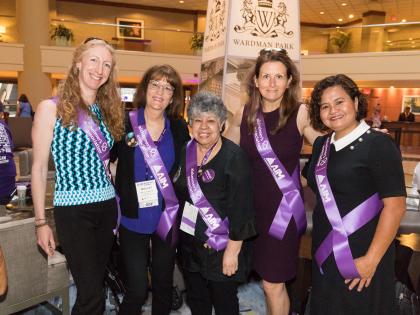Wisconsin State Alzheimer’s Plan Overview

In October 2013, the Wisconsin Department of Health Services (DHS) convened the Dementia Care Stakeholder Summit. Participants discussed a redesign of the state’s dementia care system in order to provide appropriate, safe and cost-effective care throughout the entire course of Alzheimer’s disease and other dementias. With input from the Summit, DHS released a draft State Plan for public comment and review. DHS incorporated the stakeholder input into its final published report, Dementia Care Redesign: A Plan for a Dementia-Capable Wisconsin, released in February 2014.
In 2018, DHS conducted a public survey to get input from individuals and professionals impacted by memory loss or dementia. DHS convened the 2018 Dementia Summit with key stakeholders including family caregivers, advocacy organizations, health and human services agencies, legislators, clinicians, researchers, home care providers and long-term care providers to review the public survey and identify priority areas. Four priority areas were identified: 1) Care provided in communities where people live; 2) Improving how health care providers diagnose and care for people with dementia; 3) Responding to crises involving people with dementia; 4) Care provided in assisted living, nursing homes, and other residential communities. These priorities formed the foundation of the Wisconsin State Dementia Plan: 2019–2023.
During 2022 and at the start of 2023, state partners engaged in an information gathering process through 49 different community events. Three State Dementia Plan Summits were also hosted to collect input on the next iteration of the state plan’s goals, strategies, and implementation. In April 2024, the 2024-2028 State Dementia Plan was released, which aims to enhance public education and community support, grow a dementia-capable workforce, improve coordinated care, data and research, enhance policy and advocacy, and support BOLD implementation strategies.
Wisconsin 2026 Policy Priorities

Establish Licensing Requirements for Memory Care Units
Individuals living with Alzheimer’s and other dementia make up a significant portion of those using long-term care services. They often have unique needs that may make care delivery and communication more challenging. Some assisted living communities in Wisconsin offer memory care units for residents living with dementia. However, these do not have additional licensing requirements that qualify them to deliver specialized care to these residents, causing Wisconsinites to pay more each month for services they may not be receiving. The Alzheimer’s Association is urging state lawmakers to support legislation creating a memory care licensing structure for assisted living communities.
Wisconsin State Advocacy Day
Join us for Wisconsin Advocacy Day! Connect with fellow advocates, hear from key state leaders, and learn how to use your voice to make Alzheimer’s and dementia a legislative priority. After an inspiring morning program and training, you’ll head to the State Capitol to meet with lawmakers and push for policies that improve care and support for Wisconsin families.
Sign Up to Learn About Advocacy Opportunities in Wisconsin

Find My Chapter
Together, we’re making an impact. Find an Alzheimer’s Association chapter in your community for more ways to engage.
Contact Us
State Affairs Contact: Vanessa Kent
Phone: 608.318.4057
Email: vlkent@alz.org
110,900
people living with Alzheimer’s in Wisconsin
205,000
Wisconsinites are providing unpaid care
$1 Billion
Medicaid cost of caring for people living with Alzheimer’s (2025)
2,361
deaths from Alzheimer’s in 2022
16%
in hospice with a primary diagnosis of dementia
58%
increase of geriatricians in Wisconsin needed to meet the demand in 2050
Resources to Drive Change in Wisconsin
The following resources developed by AIM and the Alzheimer’s Association will help you learn more about the issues impacting people living with Alzheimer’s and their caregivers, how Wisconsin policymakers are addressing these gaps, and how you can help drive change.